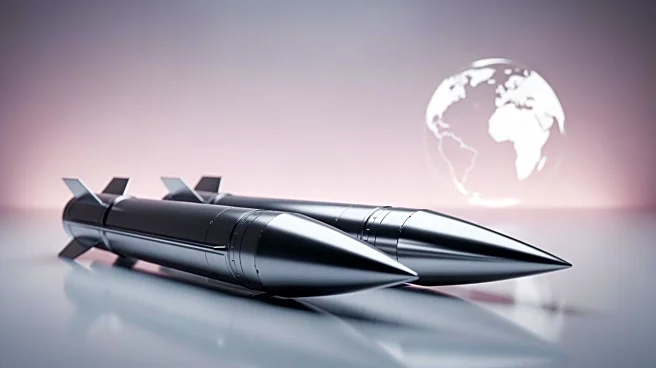What's Happening?
China's Foreign Ministry has reaffirmed its commitment to a self-defense-oriented nuclear policy, proposing a 'mutual no-first-use' treaty among the five recognized nuclear-weapon states: China, the United States, Russia, France, and the United Kingdom.
This proposal comes as China certifies two new nuclear test monitoring stations, enhancing its global verification network. China's nuclear arsenal has grown to an estimated 600 warheads in 2024, marking a 20% increase from the previous year. This expansion is seen as a strategic deterrence against the U.S. and its allies, rather than preparation for a nuclear exchange. The Comprehensive Nuclear-Test-Ban Treaty (CTBT), signed but not ratified by China and the U.S., remains a key framework, with both countries adhering to its principles since 1996.
Why It's Important?
China's proposal for a mutual no-first-use treaty could significantly impact global nuclear policy, potentially reducing the risk of nuclear conflict among major powers. The expansion of China's nuclear arsenal underscores the shifting dynamics in global strategic deterrence, particularly in relation to U.S. interests in the Asia-Pacific region. This development may influence U.S. defense strategies and diplomatic relations, as China seeks to assert its strategic objectives. The certification of new monitoring stations also highlights China's commitment to international nuclear test ban agreements, which could foster greater cooperation in global nuclear non-proliferation efforts.
What's Next?
The proposed mutual no-first-use treaty may lead to negotiations among the five nuclear-weapon states, potentially reshaping international nuclear policies. However, the CTBT's entry into force remains uncertain, as key states have yet to ratify it. The expiration of the New START Treaty between the U.S. and Russia in February could further complicate nuclear arms reduction efforts. Russia's openness to informally maintain treaty limits may prompt diplomatic discussions, but the U.S. response is still pending. These developments could influence future arms control agreements and international security dynamics.
Beyond the Headlines
China's nuclear policy and arsenal expansion reflect broader geopolitical shifts, with implications for regional security and global power balances. The emphasis on deterrence rather than direct conflict highlights the strategic calculations driving nuclear policies. Ethical considerations regarding nuclear proliferation and disarmament remain central to international debates, as nations navigate complex security landscapes. The role of multilateralism in achieving global peace and security is underscored by China's engagement with the CTBTO and its commitment to international obligations.

















